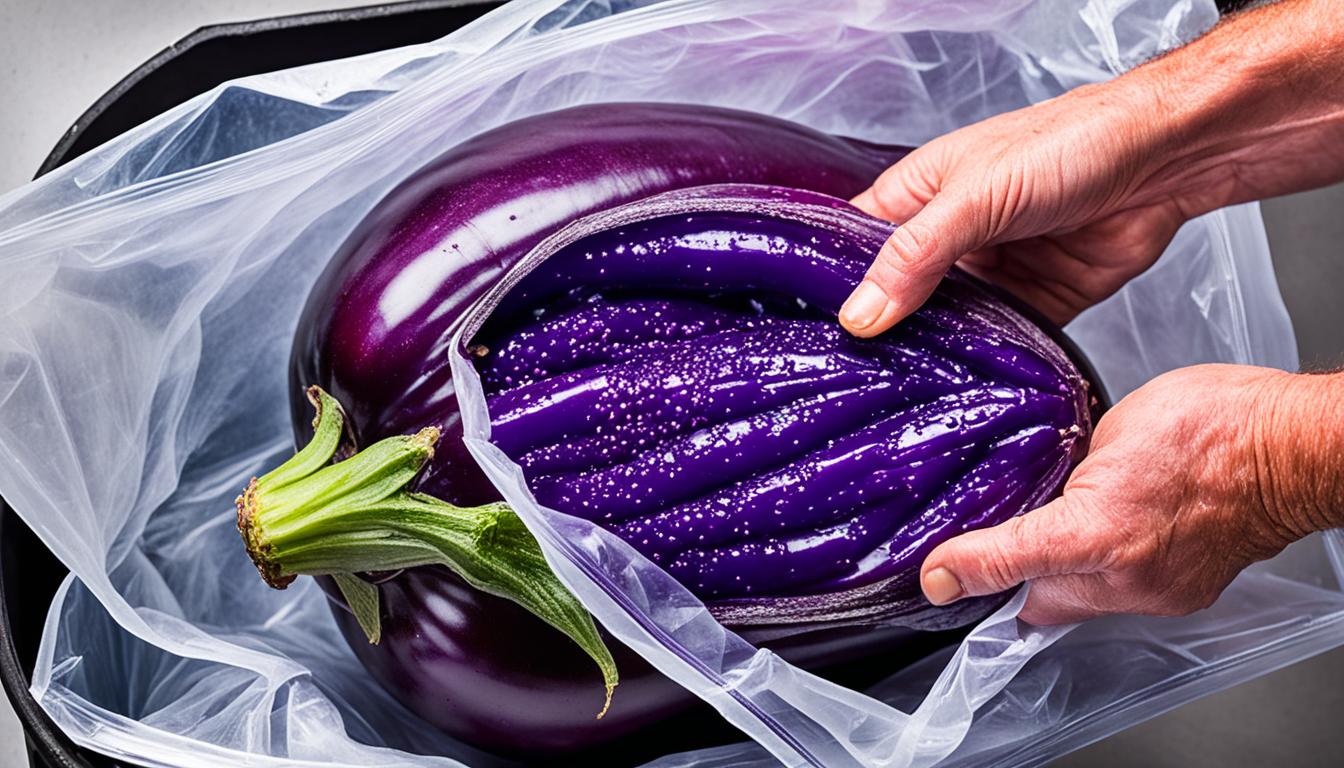Eggplant is both versatile and nutritious. It can make your dishes flavorful. But, what if you have too much eggplant? Can you freeze it for later? Yes, you can freeze eggplant. Yet, to keep its taste and texture, you need to follow some steps.
Freezing it raw can make it mushy and watery. But, with the right approach, you can freeze eggplant. Then, you can enjoy it for months to come.
Key Takeaways:
- Yes, you can freeze eggplant for later use.
- Freezing raw eggplant without preparation may cause it to become mushy.
- Proper preparation includes peeling, salting, rinsing, and microwaving the eggplant slices before freezing.
- Cooked eggplant can also be frozen and used in various recipes.
- Thaw frozen eggplant in the refrigerator overnight before using it.
Now, let’s get into how you can freeze eggplant and make it last longer.
Choosing the Right Eggplant for Freezing
Choosing the right eggplant for freezing is key. While Thai and Japanese eggplants taste great, they’re not the best for freezing. Their high water content and soft texture don’t hold up well. It’s better to go for standard eggplants, which freeze well.
Look for eggplants that feel heavy. This weight means they are fresh and full of moisture. This is important to keep their taste and texture when frozen. Also, go for eggplants with smooth and shiny skin. This shows they are ripe and haven’t been out too long.
Eggplants with fresh green leaves and stems are prime picks. If the stems and leaves look dry, they might be old. Older eggplants don’t freeze as well. Always choose eggplants that look vibrant and green.
Selecting the right eggplant is crucial for good freezing. Pick the ones best for freezing, fresh, with tight skin and green leaves. These tips will help you enjoy tasty frozen eggplant throughout the year.
Preparing Fresh Eggplant for Freezing
Freezing eggplant the right way keeps its taste and texture. Here’s how to get your eggplant ready for the freezer:
Step 1: Peel and Slice
First, peel the eggplant. Then, cut it into the thickness you like. Thinner slices freeze faster and are easier to use later.
Step 2: Salt to Draw Out Moisture
Put the slices in a colander and add some salt. The salt pulls out moisture, stopping the eggplant from getting watery when frozen.
Step 3: Rinse and Pat Dry
Wait about 30 minutes, then rinse off the salt. Dry the slices well with a towel or paper towels. This keeps ice from forming on them in the freezer.
Step 4: Prevent Browning
Stop the slices from turning brown by using lemon juice and water. Mix equal parts of each and brush it on. This keeps your eggplant looking good and colorful.
Step 5: Microwave for 5 Minutes
Put the slices in a dish that can go in the microwave. Cover it with microwave-safe plastic. Then, microwave on high for about 5 minutes. This partly cooks the eggplant, keeping its taste and texture good for freezing.
Step 6: Cool and Freeze
Let the slices cool off completely to avoid spoilage. Then, put them in airtight containers or freezer bags. Squeeze out the extra air and label with the freeze date. Now, they’re ready for the freezer.
Your eggplant slices are now prepared for freezing! Keep them frozen and use them within the recommended time for the best taste and texture.
Freezing eggplant is a great way to keep this vegetable around. By following these steps, you can have tasty eggplant for your recipes anytime, even when it’s not in season. Next, we’ll learn how to freeze cooked eggplant.
Freezing Cooked Eggplant
Freezing cooked eggplant makes it easy to use any time. You can freeze it whether it’s roasted, sautéed, or fried. Cooked eggplant works well in many dishes.
Roasting is a good way to freeze eggplant. It tastes better and keeps well. Let’s learn to freeze roasted eggplant with these steps:
- Salt and drain: Start by salting the eggplant slices. This removes extra moisture and keeps the texture good when frozen.
- Roast until browned: Heat your oven to 400°F (200°C). Put the salted slices on a baking tray. Roast them until they’re soft and brown. This makes the eggplant sweet and flavorful.
- Cool and package: After cooling the eggplant slices, put them in a freezer bag or container. Push out all the air to avoid freezer burn. Write the date and what’s inside on the container.
You can freeze more than just roasted eggplant. Try freezing breaded, fried slices for dishes like eggplant Parmesan. Freeze the slices on their own before putting the dish together.
Frozen cooked eggplant can stay in the freezer for up to three months. So, you’ll always have some ready. When you want to use it, thaw it in the fridge overnight. Then, remove any extra moisture and add it to your recipes.
Eggplant is very flexible in cooking. Use it frozen in casseroles, pasta, stir-fries, and more. Its great taste and texture can make any meal better.
Eggplant Parmesan Recipe
“This Eggplant Parmesan recipe is cozy and tasty. It uses frozen, cooked eggplant slices with marinara sauce and cheese. It’s really good.”
| Ingredients: | Instructions: |
|---|---|
|
|
Using frozen eggplant in recipes like Eggplant Parmesan is handy and tasty. Enjoy homemade dishes easily with frozen eggplant.
Thawing and Using Frozen Eggplant
Have you frozen your eggplant? It’s now time to thaw it and use it in your recipes. The process is easy but requires patience. Let’s go over the steps:
- Thaw in the Refrigerator: Put your frozen eggplant in a container or zip-lock bag. Then, leave it in the fridge overnight. This method thaws the eggplant slowly, keeping its texture and taste intact.
- Drain Off Excess Moisture: Sometimes, thawed eggplant releases liquid. To avoid a watery dish, press out this moisture using paper towels or a colander.
- Pat Dry: If your eggplant still feels wet, dab it dry with a paper towel. This keeps the flavors in your dish strong.
Now your eggplant is ready for cooking. You can use it to make many tasty dishes. Here are a few ideas:
- Pasta Dishes: Put thawed eggplant in pasta like spaghetti or penne for a rich meal.
- Ratatouille: Mix thawed eggplant with veggies like tomatoes, zucchini, and peppers for ratatouille.
- Caponata: Sauté thawed eggplant with onions, tomatoes, olives, and capers for a tangy caponata.
- Eggplant Parmesan: Make eggplant Parmesan by layering thawed eggplant with sauce and cheese.
Feel free to use thawed eggplant in many other recipes. Be creative with different flavors and combinations. Just make sure to use the eggplant within 3 to 6 months for the best taste.
Here’s a summary table for thawing and using your frozen eggplant:
| Thawing and Using Frozen Eggplant | Steps |
|---|---|
| Thaw in the Refrigerator | Place frozen eggplant in the refrigerator overnight |
| Drain Off Excess Moisture | Remove any liquid by gently pressing between paper towels or using a colander |
| Pat Dry | If needed, pat the eggplant slices dry with a paper towel |
| Usage Ideas | Add thawed eggplant to pasta dishes, ratatouille, caponata, or make eggplant Parmesan |
| Best Time to Use | Within 3 to 6 months for optimal flavor and texture |
Thawing and using frozen eggplant is convenient. It lets you enjoy this vegetable’s flavors year-round. Whether in pasta or caponata, thawed eggplant adds a great taste and texture. Just follow these thawing tips and get cooking with your eggplant!
Tips for Freezing Eggplant
Freezing eggplant can be hard if you want to keep its tastes and textures. These tips will help make sure your eggplant stays tasty and high-quality when you use it later.
- Chop and sauté the eggplant: Chop the eggplant into small pieces and lightly sauté them. This step helps keep the texture right and stops it from getting mushy after thawing.
- Use airtight containers or freezer bags: Keep the eggplant fresh by using airtight containers or freezer bags. This protects it from freezer burn and stops smells from spreading to other food.
- Label the containers: Make sure to label your containers with the date and what’s inside. This will help you know what you have and use it without guessing.
- Freeze eggplant in single layers: Spread the eggplant pieces in a single layer to freeze. This stops them from sticking together and makes it easy to take the amount you need.
- Consider breading fried eggplant: For those who love breaded eggplant, bread the slices before freezing. This way, you can cook your favorite dishes easily without extra steps.
By following these freezing tips, your eggplant will be delicious and always ready for your recipes.
Recipes Using Frozen Eggplant
If you’re searching for unique and delicious ways to cook with frozen eggplant, we’re here to help. These recipes turn this adaptable veggie into mouth-watering dishes:
- Eggplant Curry: A fragrant and flavorful curry with tender pieces of frozen eggplant.
- Eggplant Lasagna Rolls: Satisfy your Italian cravings with these cheesy and savory eggplant lasagna rolls.
- Eggplant Pasta with Marinara Sauce: Toss frozen eggplant into your pasta for added flavor and texture.
- Classic Ratatouille: A French dish that combines frozen eggplant, tomatoes, zucchini, and more for a flavorful meal.
- Italian Eggplant Caponata: A tasty sweet and savory dish or side made with frozen eggplant.
- Eggplant Parmesan Sandwiches: Stack frozen eggplant, marinara, and melted cheese for a hearty sandwich.
- Eggplant Casseroles: Whip up warm and comforting casseroles with frozen eggplant and your chosen ingredients.
These ideas prove frozen eggplant can enhance many dishes. Get creative and enjoy eggplant’s tasty flavors throughout the year.
How Long Can You Freeze Eggplant?
Frozen eggplant can last 3 to 6 months. But, for the best taste and feel, use it within 3 months.
After three months, eggplant quality may lessen. It might get mushy or not taste the same. It’s still safe to eat, though.
Try to use frozen eggplant in the first three months. You’ll get the best flavor and texture in your dishes this way.
Now, learn how to freeze other veggies. Doing this lets you keep your produce longer and cuts down on waste.
Tips for Freezing Vegetables
Freezing veggies helps keep them fresh and nutritious. Here are a few tips:
- Pick vegetables that are fresh and ripe.
- Clean, peel, and chop them as you like.
- Blanch them by boiling briefly, then cool suddenly in ice water.
- Dry the vegetables well after blanching.
- Use airtight containers or freezer bags to pack them.
- Write the date and contents on the containers.
- Keep your veggies at 0°F or colder.
These steps will help keep the good taste, texture, and nutrients of your veggies.
Freezing Guidelines for Common Vegetables
| Vegetable | Blanching Time | Storage Time |
|---|---|---|
| Broccoli | 3 minutes | 12 months |
| Carrots | 3 minutes | 12 months |
| Corn | 4 minutes | 12 months |
| Green beans | 3 minutes | 12 months |
| Onions | 3 minutes | 12 months |
| Zucchini | 2 minutes | 10 months |
“Freezing vegetables is a simple and effective way to prolong their shelf life and maximize their nutritional value.”
Follow these freezing guidelines to enjoy your favorite veggies all year. They’ll stay fresh and tasty just like when they were picked.
Freezing Other Vegetables
Eggplant isn’t the only veggie you can freeze. Many veggies keep well in the freezer for a long time. Freezing them keeps their freshness and nutrition. So, you’ll always have healthy options ready. Some good freezing choices are:
- Broccoli
- Onions
- Carrots
- Celery
- Green beans
- Zucchini
- Corn
These veggies work well in many dishes. They’re great in soups, stews, stir-fries, or casseroles. With frozen veggies at home, cooking becomes quicker and easier.
To freeze veggies right, follow these steps:
- Wash them and take off any dirt.
- Blanch the veggies by boiling them briefly, then cool them fast in ice water. This keeps their texture, color, and nutrients.
- Dry the blanched veggies well to remove extra water.
- Split them into amounts you’ll use at once.
- Use airtight containers or freezer bags to pack them, squeezing out the air to avoid freezer burn.
- Mark the containers with the veggie name and freezing date for easy finding.
- Keep the containers in the freezer at or below 0°F.
When frozen and stored right, these veggies can stay good for up to 12 months. Yet, using them within 6 to 9 months gives the best taste and texture.
Always look up specific freezing guides for each veggie. Different ones might need their own prep and freezing steps.
Benefits of Freezing Vegetables
Freezing your veggies has lots of pluses:
1. Convenience: They’re always ready, making kitchen work faster and easier.
2. Nutrition: Freezing locks in the nutritional value, letting you enjoy healthy meals all year.
3. Versatility: You can try them in many recipes, exploring new tastes and dishes.
Using the right freezing and storing techniques lets you enjoy your veggies long after their season ends.
| Vegetable | Blanching Time | Freezer Storage Time |
|---|---|---|
| Broccoli | 3 minutes | 8 to 12 months |
| Onions | 3 minutes | 8 to 12 months |
| Carrots | 5 minutes | 8 to 12 months |
| Celery | 3 minutes | 10 to 12 months |
| Green beans | 3 minutes | 8 to 10 months |
| Zucchini | 2 minutes | 10 to 12 months |
| Corn | 4 minutes | 10 to 12 months |
Conclusion
Freezing vegetables is a great way to keep them fresh longer. With eggplant, you can enjoy its flavor any time of the year. You just need to peel, slice, salt, and microwave it before freezing. This way, it stays nice and not mushy. Don’t forget to write the date on your frozen eggplant to use it at its best.
Many vegetables like broccoli, onions, and carrots can be frozen too. Freezing is a smart way to keep their taste. It also makes sure you always have veggies ready for cooking. Green beans, zucchini, and corn are other good options for freezing.
Freezing vegetables lets you have fresh veggies anytime, even when they are not in season. It’s easy if you use the right ways to freeze them. Your vegetables will keep their great taste, look, and health benefits. So, start freezing and enjoy your favorite veggies all year!





